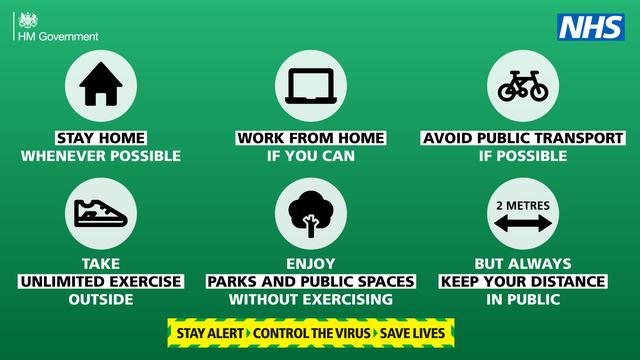Government advice on home moving during the coronavirus (COVID-19) outbreak
A new COVID-19 variant is spreading in some parts of England. There may be additional advice for your area. Find out what you need to do.
This guidance provides advice to those working with the home buying and selling process and those moving home in accordance with step 3 of the Roadmap out of lockdown from 17 May 2021. Read the current guidance on what you can and cannot do to keep safe now.
The housing market in England will remain open during this national lockdown. This means that people looking to move home will be able to both continue with planned moves and view new properties to move into in the future. Estate and lettings agents, removers, valuers and people in sales and lettings offices and show homes will be able to continue working.
This guidance provides important public health information to ensure that moving home and related activities, such as viewing property, can happen safely. It also applies to custom and self-builders looking to acquire a plot or a property to renovate or demolish.
One of the simplest steps you can take when moving home is to wash your hands frequently and keep as much distance as possible from other people who are not members of your household. Ensure you follow the latest guidance on practical steps to reduce transmission and maintain a 2 metre distance apart where possible. It may also be a good idea to take extra precautions when in close contact with others, such as wearing a face covering. There are also certain situations in which you must wear a face covering, as described below.
The process of searching for and moving into a new home is different at the moment because property agents, conveyancers and other professionals have modified how they work to reduce the risk from COVID-19. These changes could include doing more online, such as offering virtual viewings; vacating your current property during viewings; and ensuring your property is thoroughly cleaned before someone else moves in.
We encourage all parties involved to be as flexible as possible and to be prepared to delay moves, for example if one of those involved becomes ill with COVID-19 during the moving process or has to self-isolate. It may become necessary to pause all home moves locally or nationally for a short period of time to manage the spread of coronavirus. We will let you know if this needs to happen.
If you are about to enter into a legally binding contract, you should discuss the possible implications of COVID-19 with your legal professional and consider making contractual provisions to manage these risks. You should not expect to immediately be able to move into any home where people have COVID-19 or are self-isolating.
Those renting a property, letting agents and landlords should be aware of and follow the government guidance on coronavirus and renting which contains further advice that may also be applicable such as on possession proceedings, repairs, maintenance and health and safety.
Advice to the public
More detail on the steps of buying, selling, or renting a home and how this applies to different groups is set out in the next section.
What does this mean for my property move or purchase which is scheduled to take place while measures to fight COVID-19 apply?
You are free to move home. However, you may find the process of searching for and moving into a new home is different, as property agents, conveyancers and other professionals have modified how they work to reduce the risk from COVID-19.
Everyone involved in the moving process must follow social distancing to minimise the spread of COVID-19.
Self-isolating
If you have symptoms of COVID-19, however mild, or you have received a positive COVID-19 test result, you should immediately self-isolate at home for at least 10 full days from when your symptoms started. You may also be required to self-isolate if you are entering or returning to the UK from abroad or have been contacted by NHS Test and Trace. Everyone should follow the latest requirements to quarantine upon return to the UK.
You should follow the latest guidance for households with possible or confirmed COVID-19 infection. If you are contractually committed to move home, you should seek to delay your move until all members of your household have come to the end of their self-isolation period. All parties involved in home buying and selling should prioritise agreeing amicable arrangements to change completion dates where someone in a chain or their family member is self-isolating or has tested positive for coronavirus.
Clinically extremely vulnerable people
Those who identify as clinically extremely vulnerable are able to move home. However, they should consider their personal situation and the circumstances of their move and may wish to seek medical advice before deciding whether to commit to or go ahead with a move. Some moves are likely to be lower risk - for instance if the home is empty, all travel can take place in their own transport and they can avoid contact with others.
Where people decide to move they should pay particular attention to maintaining hygiene and social distancing measures to protect themselves and reduce the risk presented by the coronavirus. People in this category should:
1. Preparing to buy, sell or move home
You can put your home on the market and look for properties to buy or rent. However, if you or any member of your household is showing symptoms of COVID-19 or is self-isolating, then estate agents and potential buyers should not visit your property in person. Everyone should follow the latest guidance for households with confirmed or possible coronavirus infection.
2. Viewings
Where possible, you should use virtual viewings before visiting properties in person in order to minimise public health risks. If any member of either the household being viewed or the household undertaking a viewing is showing symptoms of COVID-19 or is self-isolating, then an in-person viewing should be delayed.
3. Making offers or reservations
You are free to make or accept an offer or reserve a property as normal.

4. Property searches and surveys
Your legal representative should be able to carry out searches on your property online in order to progress your transaction and you should contact them to discuss timescales for this work.
Your surveyor can undertake surveys of the property you wish to purchase. There are no restrictions on the types of survey that can be carried out and you should talk to your surveyor to understand the most appropriate type of survey for the home you intend to purchase.
On custom and self-build projects, surveyors can visit plots you wish to purchase and undertake valuations to support the release of staged payment mortgages.
5. Agreeing to move
Once you have exchanged contracts or signed a tenancy agreement, you have entered into a legal agreement to purchase or rent the property. We encourage all parties to be as flexible as possible and be prepared to delay moves if necessary, for example if someone involved in the transaction becomes ill with COVID-19 during the moving process or has to self-isolate. You should not expect to move into any home where people are ill or self-isolating.
6. Moving your belongings
Removal firms are able to carry out work but their usual procedures may be different to ensure moves take place as safely as possible.
Advice to industry
All businesses should follow the government’s latest guidance for employers and businesses on COVID-19 and safer working guidance. Individual sector bodies may issue their own supplementary guidance in order to protect their members.
We encourage all professionals to familiarise themselves with relevant government guidance and any supplementary guidance issued by their representative bodies.
It is important that all businesses work together to ensure we minimise the spread of infection and we expect all sectors to consider how they can operate in a way which minimises the need for face to face contact.
“Back to back” viewings of properties should be avoided, with sufficient time allowed between each viewing for the necessary cleaning to take place. Indoor gatherings should be limited to a group of up to 6 from any number of households (children of all ages count towards the limit of 6). Gatherings can also consist of a group of any size from up to two households (each household can include an existing support bubble, if eligible). This accommodates large families who may not otherwise be able to meet.
We advise all businesses to have measures in place to prepare for staff returning from countries on the list of those affected by the requirement to quarantine according to the red, amber and green system.Affected staff members will not be able to return to the office or meet clients and will need to work virtually where possible.
Estate agents
Estate agency offices can remain open to the public. Estate agents should inform customers and their own staff about their Covid-19 procedures, so that they are safe throughout the sales process.
Developers and new build sales
Developers can continue with sales during this period but should ensure that their sales teams follow the government’s safer working guidance. Developers should inform consumers and their own staff about their procedures, so that they are safe throughout the sales process.
Tradespeople
Moving home is often a time when people want to undertake repairs and improve their new home or prepare their old home for sale. This work can involve fitting new kitchens, redecorating, and other home improvement work.
This work is also important when people aren’t moving home. It is a key way for households and landlords to maintain and improve the home environment and address poor quality accommodation while also providing important work for tradespeople whose businesses have been affected by the virus.
Tradespeople should follow the follow the government’s safer working in the home guidance. Companies should ensure employees understand how to operate safely and communicate this to customers.
Conveyancers
Conveyancers can open for business and can take on new instructions. They should make sure their clients are aware of the differences in completing transactions during this period.
New Build Home Warranty Assessments and claims against the warranty
Inspectors can carry out warranty assessments on new build properties including self and custom build. Inspectors should follow public health guidance on social distancing and guidance for working in other people’s homes.
Companies should ensure employees understand how to operate safely and communicate this to customers.
Surveyors and EPC assessors
Surveyors and EPC assessors are free to visit properties to carry out surveys. Surveyors should follow the latest government guidance for working in other people’s homes.
Where surveys are carried out, all public health guidance on social distancing must be followed. Companies should ensure employees understand how to operate safely and communicate this to customers.
Removals firms
Removal firms are allowed to operate and should follow the latest government guidance on safer working. Where moves are carried out, social distancing should be followed. Companies should ensure employees understand how to operate safely and communicate this to customers.
Letting agents and private landlords
Letting agents and landlords should be aware of and follow the regularly updated government guidance on coronavirus and renting which contains further advice that may also be applicable such as on possession proceedings, repairs, maintenance and health and safety. Tenants should also be made aware of this guidance.
Tenants’ safety should be letting agents’ and landlords’ first priority. The government has put in place protections for tenants during the coronavirus outbreak, including legislation to delay when landlords are able to start proceedings to evict tenants by requiring landlords to give tenants longer notice periods than usual.
The guidance below for landlords and letting agents is to help them safely let empty properties, or properties which tenants are voluntarily vacating. Letting agents and landlords should endeavour to work with their tenants to sustain tenancies as far as possible, where the tenant wants to and is able to stay.
Social landlords
Allocation by local housing authorities is governed by Part 6 of the Housing Act 1996 and authorities must have regard to statutory guidance. Registered providers of social housing should refer to the relevant regulatory standards set out by the Regulator of Social Housing.
Landlords will need to consider how to carry out their activities in line with the latest guidance on practical steps to reduce transmissionPractices should also be carried outin line with this wider guidance, including:
Some applicants and tenants may be anxious about moving at this time. It will be important to ensure that they are not put under undue pressure to move if they are not ready or able to do so.
It will also be important to discuss with applicants and tenants their state of health, level of vulnerability and their arrangements for moving (including any assistance required) before proceeding with the move.
Landlords should avoid moving tenants who are showing symptoms of coronavirus or self-isolating. There may be exceptions to this (e.g. safety reasons) and in these scenarios landlords should speak to the local Public Health team about appropriate infection control measures before taking any action. Tenants seeking mutual exchange should be directed to the Advice to the public section above.
Right to Buy
The Right to Buy is governed by Part 5 of the Housing Act 1985 which sets out the right of eligible social tenants to purchase the home they currently rent and occupy; and the timescales for doing this.
Tenants have the right to purchase their home within the provisions of the legislation. The government recognises that the measures put in place to combat coronavirus are likely to make it difficult for councils to process Right to Buy applications within the statutory timescales.
Landlords will want to consider how best they can manage the application process to ensure tenants are able to take up their Right to Buy within a reasonable timescale, while acting in accordance with government guidelines on social distancing.
This could include options around:







